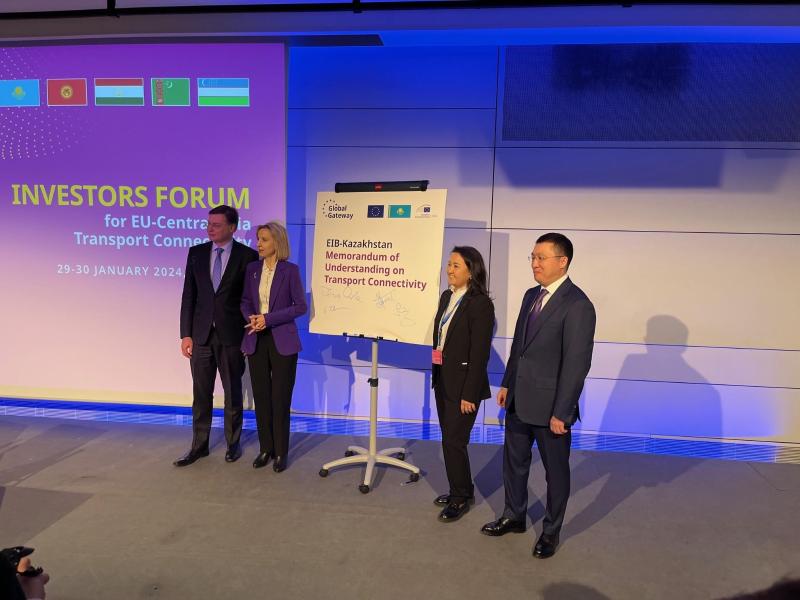
- €3 billion to be mobilised for connectivity projects in Central Asia
- EU bank to share its long-term global expertise in project financing in the region
- A milestone in implementing the EU-Central Asia and Global Gateway strategies
EIB Global has signed memorandums of understanding for project co-financing with the Republic of Kazakhstan, the Kyrgyz Republic, the Republic of Uzbekistan and with the Development Bank of Kazakhstan for a total of €1.47 billion at the EU-Central Asia Investors Forum held in Brussels today.
The European Union will provide a helping hand to upgrade the transport sector in Central Asia through the EIB co-financing provided under favourable terms. The financing is expected to mobilise additional capital resulting in total support to sustainable transport projects of €3 billion. The EIB will also share its global long-term expertise in this sector with its partners in Central Asia — the Bank has financed transport projects to the tune of €136.5 billion globally over the last decade.
EIB support for sustainable transport in the region will help to achieve EU priorities as defined in the EU-Central Asia Roadmap and to implement targets of the Global Gateway, which is essential for modernising economies and societies inside and outside the European Union.
EIB Vice-President Teresa Czerwińska said: “EIB investment will improve people’s quality of life and strengthen economic growth and employment opportunities. It will help to bring people closer together and foster social and gender equality. Transport is the backbone of the modern economy, facilitating personal mobility and enabling goods, capital and services to be exchanged between the countries of the region. In addition, investing in sustainable transport is key to addressing climate impact and enhancing the resilience of transport networks.
European Commission Executive Vice President Valdis Dombrovskis stated: “Today’s Memoranda of Understanding represent an opportunity for both the EU and Central Asian countries. We are committed to strengthening our trade relations in a way that benefits both regions. Today’s €10billion overall commitment by international partners will help to develop connectivity, boost trade exchanges and sustainable transport projects, and take this partnership to the next level.”
Minister of Transport of the Republic of Kazakhstan Marat Karabayev stated: “Given the relevance of inland corridors between Europe and Asia, we need to implement a number of infrastructural projects to make freight transportation efficient. This memorandum of understanding will serve to drive the implementation of major interregional cooperation initiatives.”
Deputy Chairman of the Cabinet of Ministers of the Kyrgyz Republic Bakyt Torobaev added: “The Memorandum signed today is an important element of our cooperation aimed at strengthening interregional transport connectivity. I express confidence that through joint efforts, we will soon launch significant and large-scale projects that will make an additional contribution to the development of our country's transport infrastructure. I would like to emphasize that the Kyrgyz Republic holds one of the most advantageous geographical position on trade routes and has great potential for connecting the East and the West, as well as the North and the South, and is ready to serve as a transit hub."
Minister of Transport of the Republic of Uzbekistan Ilkhom Makhkamov said: “This agreement marks a new era of progress for Uzbekistan and our neighbors. As we sign a MOU, we are paving the way for transformative progress in the transport sector. This collaboration is our shared commitment to enhance the sustainable transport connections between Europe and Central Asia. Through this partnership, we are investing not only into our infrastructure but also in the prosperity and well-being of our people. Together, we will create bridges that will carry us towards shared goals of development and sustainable future for all”.
Deputy Chairman of the Management Board of the Development Bank of Kazakhstan (DBK) Botagoz Abisheva noted: “Within the framework of cooperation with the EIB, an agreement has been achieved for the potential provision of a facility to DBK for a total amount of up to €320 million. These funds are designed to support projects across diverse sectors of the economy, with a focus on developing sustainable transport infrastructure connecting Europe and Central Asia. This cooperation is intended to enhance trade relations between the two regions.”
Background information
About the European Investment Bank
The European Investment Bank (ElB) finances sound investments that contribute to EU policy objectives. EIB projects bolster competitiveness, drive innovation, promote sustainable development, enhance social and territorial cohesion, and support a just and swift transition to climate neutrality.
About EIB Global
EIB Global is the EIB Group’s specialised arm dedicated to operations outside the European Union, and a key partner of the EU’s Global Gateway strategy. We aim to support at least €100 billion of investment by the end of 2027, around one-third of the overall target of Global Gateway. Within Team Europe, EIB Global fosters strong, focused partnerships alongside fellow development finance institutions and civil society. EIB Global brings the Group closer to local communities, companies and institutions through our offices across the world.
Since the start of EIB operations in Central Asia in 2011, the EU bank has signed loans amounting to €1.1 billion to date in Kazakhstan, Kyrgyzstan, Tajikistan and Uzbekistan, supporting multiple infrastructure and economic sectors such as energy efficiency, renewable energy, water management and improved access to finance for small businesses.
The EIB and sustainable transport
The EIB finances projects that drive greener, safer and more efficient and accessible transport, in line with its Transport Lending Policy, updated in July 2022 following the adoption of the Climate Bank Roadmap and the European Green Deal. This policy sets the investment priorities needed to overcome the challenges facing the transport sector, and those best able to power the shift to a more sustainable transport system.

©EIB
Download original

©EIB
Download original

©EIB
Download original

©EIB
Download original